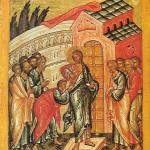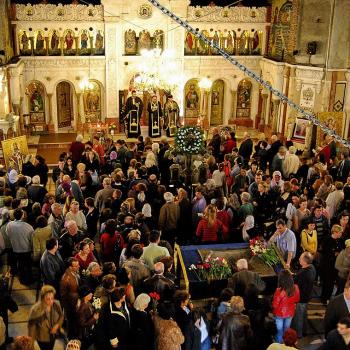
When we worship God with others, such as at a Vespers Service, or during a Divine Liturgy, we must make sure we keep ourselves properly focused, making sure we do not turn our attention to others and what they are doing. God does not need our worship; when we go, it is for ourselves. Worship should be done out of love, for then, it will help us open ourselves up to God and God’s love for us. Thus, our worship provides us a means to commune with God, and through that communion, find ourselves being infused with all kinds of graces, as our bond with God helps us participate in the divine life itself. And, as it is meant to help us grow in our love for God, it will also lead us to love what God loves, including and especially those who are with us in our celebration. If we use the liturgy as an occasion to look at others and judge them, we will have done the opposite, as we will become more and more hostile, cutting ourselves over from others, and through such exclusion, we our love for God will also become less and less, leading us to have less and less connection with God and the graces those connections should bring to us.
Jesus told us we are to love God and our neighbor as ourselves; our liturgical practice, our worship, our reception of communion, is meant to help us grow in that love. Being judgmental breaks down that communion. What makes us do this? More often than not, it is due to some element of pride, for pride makes us think ourselves as being better than we are; once we view ourselves as superior to others, we think we can and should use ourselves as the example others should imitate, and in relation to how they differ from us, we judge and condemn them. It is this kind of pride which makes us think our liturgical preferences are the best and so everyone should embrace them, because if they do not, then there is something wrong with them as they must be seen as being irreverent in their liturgical practices.
Abba Isaiah said that when we are worshiping God, we should be humble, which means, the only concern we should focus on, if any, is ourselves and our own imperfections. While we should not let ourselves fall into despair thinking we are sinners who God cannot and will not love, we should remember the ways we have acted wrongly, the mistakes we have done in life, so that in and through such humility we are open to all that God would offer us to help us become better:
Abba Isaiah said: ‘When you are performing your liturgy, if you do it in humility of mind as one who is unworthy, it has weight with God. But if you raise up in your heart and think of somebody who is sleeping or neglectful and you condemn him, your labour is in vain.’ [1]
The more we focus on others, and what we think they are doing wrong, the further we are from the humility and love we should have. While we should never be judgmental, this is especially true in regards the liturgical setting. If we see someone sitting when we think they should be standing or kneeling, let them be – we do not know them and their circumstances: they probably cannot stand for a long period of time. If we think a permissible liturgical practice, such as communion in the hand, is a disgrace and lacks proper reverence, our own disdain, and the judgment we make, is what is irreverent, not what they are doing. Once again, it is pride which makes us act this way, similar to the way Satan is said to have fallen due to pride. Some stories of Satan’s fall suggest he was unwilling to bow before humanity, thinking only God deserved such honor and respect, and so it was the pretense of honoring God which led Satan to abandon God. Satan’s pride made him think he was better than others, and so he didn’t want to show them honor or respect – he thought the only one he could be expected to honor is God, while others could and should honor and respect him. Satan did not love as God intended him to love, because if Satan loved as God wanted, he would not have found it contemptible to show humanity, or the rest of God’s creation, with respect. St. Gregory the Great, therefore, warns us against pride by saying:
The pride, therefore, of the devil became the occasion of our perdition, and the humility of God has been found the argument for our redemption. For our enemy, having been created among all things, desired to appear exalted above all things; but our Redeemer, remaining great above all things, deigned to become little among all things.[2]
Pride, like so many sins, uses various elements of the truth and goodness to justify itself; indeed, if often uses the good someone does to justify itself. Satan’s greatness before the fall is exemplified in the great evil he has done after; only because he was great, only because he had a lot of good in him, could he fall so far and have the power to do so much evil. We often do the same thing. We justify our evil due to the good we see connected with it. When we judge others during the liturgy, we excuse it by saying it would do them good to hear our criticism, when in reality it is about doing ourselves good by making us feel superior to them. Instead of seeing ourselves as great, we should rather be poor in spirit, looking to God for mercy and grace, realizing that without God, without others, we would have nothing, and in this poverty of spirit, we will be able to overcome Satanic pride:
They are “poor in spirit” because they are not puffed up with the devil’s pride nor with any swelling of evil, but they maintain humility of spirit with faith. And certainly they are “poor in spirit” because they keep themselves away from worldly riches, from the desire of the world, from all earthly flesh. The Lord shows that these people are blessed in this manner when he says, “Blessed are the poor in spirit, for yours is the kingdom of heaven.” In respect to the world those who are like this seem poor, but they are rich in God. [3]
It might be difficult, as we are human, and there are things other people do which will annoy us, but we must do what we can to stop being so judgmental, especially when we come together with others to worship God. For we are to worship God with love, embracing love, using that love to draw us closer to God, and through our union with God, with each other. Pride, and the judgment it brings, will only undermine this.
[1] More Sayings of the Desert Fathers. An English Translation And Notes. Ed. John Wortley (Cambridge: Cambridge University Press, 2019; repr. 2023), 32 [“Sayings Preserved in Greek”: G64; G65].
[2] St. Gregory the Great, Pastoral Rule. Trans. James Barmby, DD in NPNF2(12): 41.
[3] St. Chromatius of Aquileia, Sermons and Tractates on Matthew. Trans. Thomas P. Scheck (New York: Newman Press, 2018), 32 [Sermon 5].
Stay in touch! Like A Little Bit of Nothing on Facebook.
If you liked what you read, please consider sharing it with your friends and family!
N.B.: While I read comments to moderate them, I rarely respond to them. If I don’t respond to your comment directly, don’t assume I am unthankful for it. I appreciate it. But I want readers to feel free to ask questions, and hopefully, dialogue with each other. I have shared what I wanted to say, though some responses will get a brief reply by me, or, if I find it interesting and something I can engage fully, as the foundation for another post. I have had many posts inspired or improved upon thanks to my readers.













